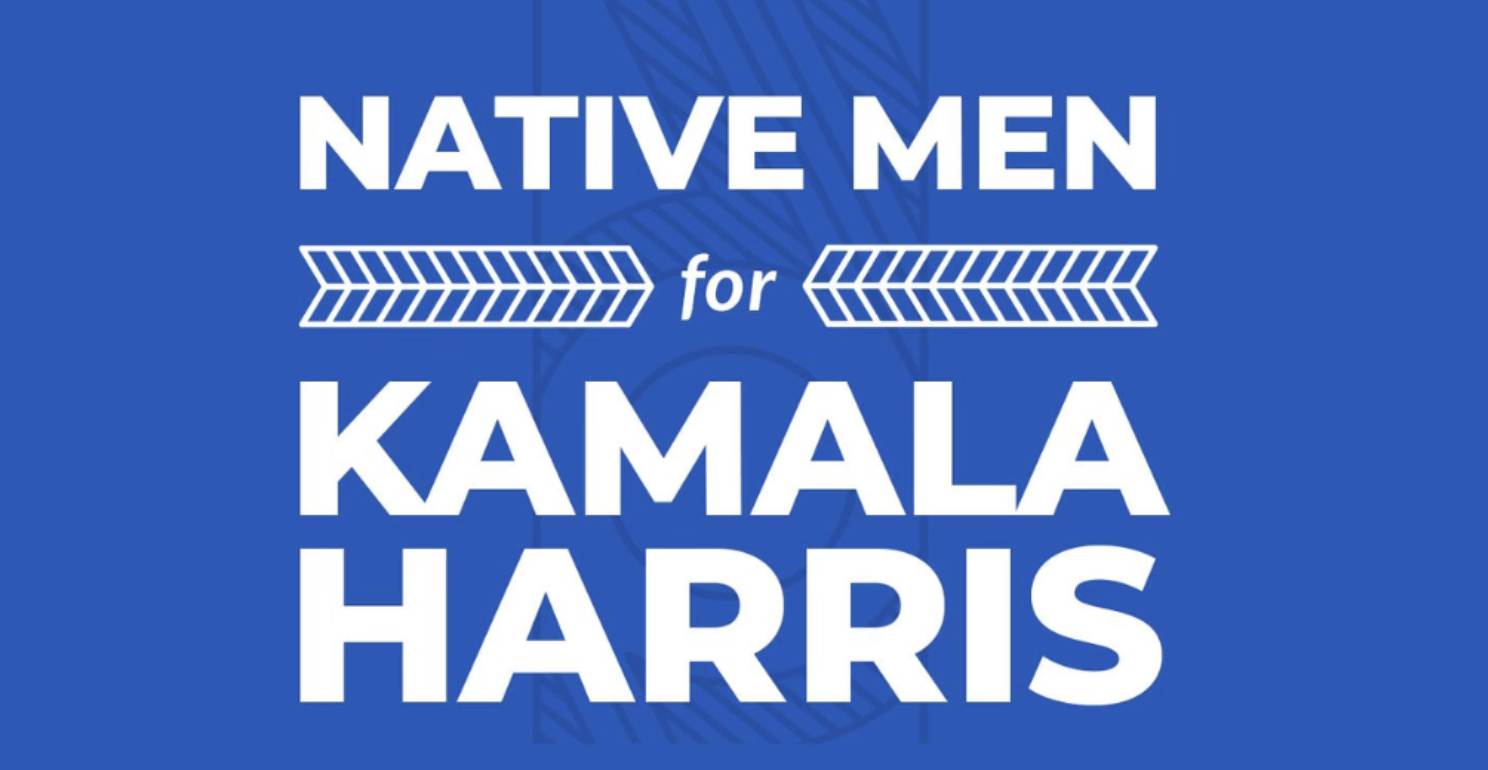
- Details
- By Donovan Quintero
Native Vote 2024. GALLUP, N.M. – In a show of support for Vice President Kamala Harris’s presidential candidacy, the organization Native Men for Kamala Harris successfully raised $15,000 during a virtual fundraising event held on Wednesday night.
Minnesoata Lt. Gov. Peggy Flanagan, (White Earth Band of Ojibwe) said during the event that she is elated over Harris selecting Minnesota Gov. Tim Walz as her running mate.
“The last 36 hours of my life have been a little hectic, but so good because my partner in justice, Governor Tim Walz, was named as her (Kamala Harris’s) vice presidential pick. When that was announced, I burst into tears, tears of joy, and was able to, shortly thereafter, have a conversation with the governor. He was giddy and ready to go to work governing,” Flanagan said.
The event, which drew nearly 200 attendees, focused on the importance of Indigenous representation in government and the pressing issues facing Native American communities today. Participants shared personal stories and experiences, highlighting the critical need for strong leadership that prioritizes the rights and well-being of Native peoples.
Flanagan touted Walz’s laundry list of accomplishments. She said Walz was the first governor in the U.S. to establish a Missing and Murdered Indigenous Relatives office.
“We codified government-to-government tribal consultation with all of our eleven tribal nations in the state of Minnesota; we now require every state agency — all of our commissioners, deputy commissioners, assistant commissioners, to go through tribal state relations training — including everybody who works in the office of Governor and Lieutenant Governor,” Flanagan continued. “We funded the American Indian Scholars Program, which provides college access and tuition for Native students across the state of Minnesota, and expanded our Minnesota Indian teacher training program.”
Flanagan is on track to become the first-ever female Indigenous governor of any state, assuming Kamala Harris and Walt defeat Republican candidate Donald Trump and his vice presidential candidate Ohio Sen. JD Vance in November.
Throughout the Native Men for Harris event, attendees engaged in discussions on various topics, including education, health care, and economic development within Native American communities. The dialogue highlighted the favorable policies Harris has proposed that could have a lasting positive impact on Indigenous populations.
Native American Rights Fund Deputy Director Matt Campbell, who attended the virtual event in his own personal capacity, told the online attendees that despite Native voters flexing “their power” on Election Day, which got President Joe Biden elected in Arizona in 2020 and helped Sen. Heidi Heitkamp serve North Dakota from 2013-2019, their right to vote is always under threat.
Campbell highlighted North Dakota’s enactment of the most restrictive voter ID law in the country, which directly targets Native voters, and Arizona’s address requirement to vote.
“We know they just don’t exist on many reservations. We know that many of our local counties place polling places, sometimes one hundred miles away from the reservation, just to make it difficult to vote,” said Campbell. “We’ve seen so many other barriers raised over the years, whether it’s language barriers and not translating ballots or placing polling places and chicken coops in places like South Dakota, but we know our people are resilient and we know we’re here to fight and make sure that the right to vote is protected.”
The $15,000 raised during the online discussion will help support outreach efforts aimed at increasing voter engagement among Native Americans and amplifying their concerns in the electoral process.
More Stories Like This
Native News Weekly (August 25, 2024): D.C. BriefsUS Presidents in Their Own Words Concerning American Indians
Indigenous Actor Elaine Miles Reports Detention by Alleged ICE Agents
Happy Thanksgiving from Native News Online
Coming Up on Native Bidaské: Behind the Animation: Joey Clift Talks “Pow” and Native Storytelling
Help us tell the stories that could save Native languages and food traditions
At a critical moment for Indian Country, Native News Online is embarking on our most ambitious reporting project yet: "Cultivating Culture," a three-year investigation into two forces shaping Native community survival—food sovereignty and language revitalization.
The devastating impact of COVID-19 accelerated the loss of Native elders and with them, irreplaceable cultural knowledge. Yet across tribal communities, innovative leaders are fighting back, reclaiming traditional food systems and breathing new life into Native languages. These aren't just cultural preservation efforts—they're powerful pathways to community health, healing, and resilience.
Our dedicated reporting team will spend three years documenting these stories through on-the-ground reporting in 18 tribal communities, producing over 200 in-depth stories, 18 podcast episodes, and multimedia content that amplifies Indigenous voices. We'll show policymakers, funders, and allies how cultural restoration directly impacts physical and mental wellness while celebrating successful models of sovereignty and self-determination.
This isn't corporate media parachuting into Indian Country for a quick story. This is sustained, relationship-based journalism by Native reporters who understand these communities. It's "Warrior Journalism"—fearless reporting that serves the 5.5 million readers who depend on us for news that mainstream media often ignores.
We need your help right now. While we've secured partial funding, we're still $450,000 short of our three-year budget. Our immediate goal is $25,000 this month to keep this critical work moving forward—funding reporter salaries, travel to remote communities, photography, and the deep reporting these stories deserve.
Every dollar directly supports Indigenous journalists telling Indigenous stories. Whether it's $5 or $50, your contribution ensures these vital narratives of resilience, innovation, and hope don't disappear into silence.
 The stakes couldn't be higher. Native languages are being lost at an alarming rate. Food insecurity plagues many tribal communities. But solutions are emerging, and these stories need to be told.
The stakes couldn't be higher. Native languages are being lost at an alarming rate. Food insecurity plagues many tribal communities. But solutions are emerging, and these stories need to be told.
Support independent Native journalism. Fund the stories that matter.
Levi Rickert (Potawatomi), Editor & Publisher
